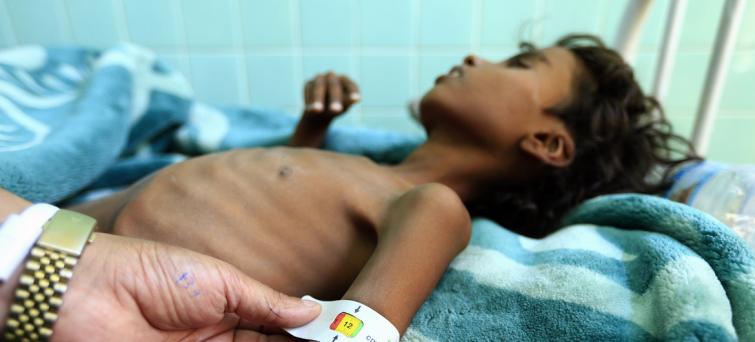
New York, Feb 20 (IBNS): “Significant progress” is being made in implementing the deal reached in Stockholm last December between Government and Houthi leaders in Yemen, according to United Nations Special Envoy Martin Griffiths.
Briefing the Security Council via video conference from Amman, Jordon, Griffiths confirmed that under the “strong leadership” of Lt. Gen. Michael Lollesgaard, who heads the UN operation monitoring a cease-fire in Yemen’s key port of Hudaydah, the parties had agreed that the first step of the so-named Hudaydah redeployment plan. would be withdrawal from the ports of Saleef and Ras Isa.
Step two will be fwithdrawal rom Hudaydah port, which remains the humanitarian lifeline for millions of Yemenis on the edge of famine.
“This will facilitate humanitarian access to the Red Sea Mills,” which he explained “holds enough food to feed 3.7 million people for a month.”
He called the Stockholm agreement “a breakthrough,” saying it was “a major shift” that showed the Yemeni people that something was “indeed happening.”
Griffiths expressed his gratitude for the concessions made by both sides and called upon them to “immediately” work to agree on the details of the second phase of the redeployments.
Noting that the first phase of the Hodeidah redeployment plan signaled the parties’ commitment, he spelled out: “There is momentum on Yemen.”
“There have,” he told the Council, “been signs of increased civilian activity in Hudaydah and the people of the city are already, at this very early, very early stage seeing some tangible benefits from the significant and consistent decrease in hostilities in that area as a result of the Stockholm agreement.”
According to Griffiths, the agreement on Phase I demonstrates that the parties can to turn their words into tangible progress on the ground while it “reinforces trust” and “most importantly,” shows political will.
Conflict in Yemen escalated over the last three years, following a Saudi-led military intervention against the Houthi rebel insurgency, at the request of Yemeni leadership.
By implementing the Hodeidah Agreement, the UN envoy said that we have the opportunity “to move from the promise made in Sweden to hope now for Yemen,” he stated.
Turning to the prisoner exchange agreement, he thanked the dedicated Supervisory Committee – including the Yemen Government and the forces affiliated with the Houthi movement, or Ansar Allah – for stepping up efforts to release and exchange all detainees and forcibly disappeared and missing persons.He indicated that it was time now to focus on finding a political solution “to bring this conflict to a close.”
“All for all…is the watchword for this process” he said, referring to the release of all prisoners from all sides.
Although he’s often called Hudaydah “the center of gravity of the conflict,” he said that in truth, “the real center of gravity for us, has to be moving towards a political solution.”
While tangible progress is needed before moving forward, he said that we can now we can begin to “focus our minds on finding that political solution.”
For his part, Emergency Relief Coordinator Mark Lowcock updated the Council on the 2019 Humanitarian Needs Overview for Yemen, which shows numbers that he called “considerably worse than last year.”
He painted a grim picture of some 24 million people, or 80 per cent of the population, in need of humanitarian assistance; about 20 million need help securing food, 10 million of whom are a step away from famine; almost 20 million lack healthcare; and nearly 18 million do not have enough clean water or sanitation.
“More than three million people – including two million children – are acutely malnourished,” he told the Council. “Some 3.3 million remain displaced from their homes, including 685,000 who have fled fighting along the west coast since June 2018.”
He cited conflict, disregard for international humanitarian law and the 2018 economic collapse as the driving forces behind the deterioration.
“Violence has declined in Hudaydah following the Stockholm Agreement, but it has continued elsewhere and escalated in some front-line areas – particularly in Hajjah,” he continued. “Amidst the conflict the economy continues to unravel.”
The Yemeni rial is losing value and aid agencies are running out of money.
“In short,” he said, “things are very bad.”
Pointing out that the UN-coordinated humanitarian relief operation in Yemen is the world’s largest, Lowcock, noted its “impressive results” in assisting nearly eight million people across the country every month last year, despite numerous hindrances.
Obstacles in delivering life-saving assistance went beyond funding to include visa delays, movement restrictions, import delays, bureaucratic impediments, and restrictions on monitoring or interference with humanitarian action.
“We are particularly concerned that the operating environment is becoming ever more restrictive in northern Yemen,” he stated.
Support Our Journalism
We cannot do without you.. your contribution supports unbiased journalism
IBNS is not driven by any ism- not wokeism, not racism, not skewed secularism, not hyper right-wing or left liberal ideals, nor by any hardline religious beliefs or hyper nationalism. We want to serve you good old objective news, as they are. We do not judge or preach. We let people decide for themselves. We only try to present factual and well-sourced news.







